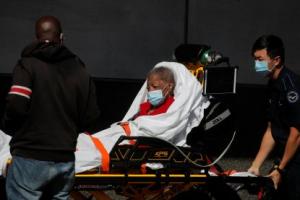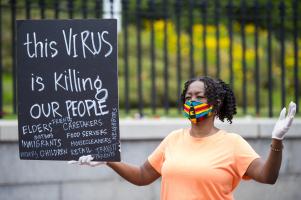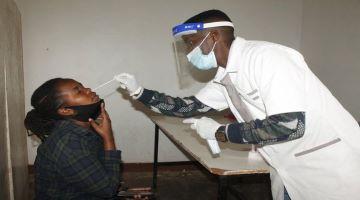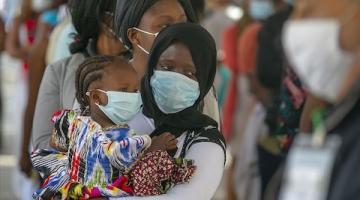The pandemic shows the contradictions between the needs of capitalism and the health of the people.
“India and the US have both failed in facing what is essentially a public health challenge..”
As the pandemic continues to spread throughout the world, many countries seem to have given up the fight against COVID-19 and are now waiting for a vaccine to protect against the virus. With cases exceeding 32 million, and more than a million dead, the world economy has taken a bigger hit than at any other time since the end of the Great Depression of 1929-39.
The U.S. and India are now showing the highest numbers of total and new cases of COVID-19. Both have stopped talking about how to stop the pandemic, and are only focusing on reopening—or as India calls it, “unlockdown.”
Giving up on containing the COVID-19 pandemic is an admission that public health systems have failed. India, with a poor public health infrastructure, has one of the most privatized health care systems in the world. The U.S. has the most privatized health care system among wealthy countries, with poor outcomes. It is not surprising then that both these countries have failed in facing what is essentially a public health challenge. The COVID-19 pandemic shows the contradictions between the needs of capitalism and the health of the people. Capitalism requires ill-health for making profits: selling patented medicines, costly stays in hospitals, and expensive procedures. The objective of the public health system is to ensure that people stay healthy, robbing capitalists of the opportunity to make profits.
The good news for the world is that 41 vaccines—more accurately candidate vaccines—are currently under different phases of clinical trials, and another 151 are in the pipeline. Two of the vaccines currently in Phase 1/2 trials are being developed by Indian companies—one from Cadila Healthcare Limited and the other from Bharat Biotech—and are set to start their Phase 3 trials soon. Bharat Biotech is also working with Washington University School of Medicine in St. Louis on a nasal route for delivering a vaccine.
“Capitalism requires ill-health for making profits: selling patented medicines, costly stays in hospitals, and expensive procedures.”
Normally, vaccine development and testing take from five to ten years, so it would be a significant achievement if we succeed in making effective vaccines available by the end of 2020 or early 2021. The progress so far also shows that we have the scientific capacity to develop a large number of vaccines for infectious diseases. The reason we have not done so for diseases other than COVID-19 is that such infectious diseases were thought to be the diseases of poor countries, and do not provide enough profits for global big pharma to invest in vaccines against infectious diseases. It required a public health emergency in the rich countries for vaccine development to take a front seat in medical science again.
As immunity may not be permanent, unless we have herd immunity at the global level, we will continue to see outbreaks in different countries. The virus will not respect national boundaries. And while large parts of the global population have no guarantee of a vaccine, the rich countries with 13 percent of the world’s population have reserved more than half the vaccines from the leading vaccine manufacturers.
India may be luckier than most other developing countries as it has a large capacity for manufacturing vaccines. If a vaccine from AstraZeneca-Oxford comes through, Serum Institute of India, Pune, which is partnering with AstraZeneca, has earmarked a significant part of its output for India. Cadila’s and Bharat Biotech’s vaccines are currently in clinical trials. They also have a significant capacity for vaccine manufacture. Dr. Reddy’s Laboratories, an Indian company, has partnered with Russia’s Gamaleya Research Institute of Epidemiology and Microbiology for distribution of the Sputnik V vaccine. Contrary to some news reports, Russia’s Sputnik V was never authorized for the general population and is currently undergoing Phase 3 trials since August in various countries—Russia, the United Arab Emirates, Saudi Arabia, Brazil, Mexico and possibly India.
“We have the scientific capacity to develop a large number of vaccines for infectious diseases.”
After the disaster of U.S. President Donald Trump’s handling of the pandemic, he is desperate to claim success in some way or another before the November elections. He has been pressuring the Food and Drug Administrationto give emergency authorization to some of the vaccines that the U.S. has invested in through its $11 billion Operation Warp Speedprogram. These vaccines have to provide evidence that they are safe and provide sufficient immunity by either preventing the disease or limiting it to a mild form. As some of these vaccines are two-shot vaccines and need at least two months after the final shot to be effective, there is no way that such an exercise can be done by the U.S. presidential election on November 3.
After public criticism of the FDA’s earlier emergency use authorization for hydroxychloroquine and convalescent plasma therapy, both of which turned out to be of little value, the FDA is cautious about making a third mistake, especially as vaccine skepticism is strong in the United States. Dr. Anthony Fauci, who heads the National Institute of Allergy and Infectious Diseases in the U.S., has termed the anti-vaxxers as a part of the anti-science movement that has gained significant influence in the United States. Anti-science, racism and a deep distrust of the government are driving the rightward shift in U.S. politics. A misstep on vaccines can cause significant damage in protecting people in the long run.
We have also seen similar missteps in India, where the Indian Council of Medical Research’s (ICMR) director general issued a stern directive in his letter in July to 12 hospitals participating in trials for Bharat Biotech’s vaccine Covaxin, demanding that all trials—Phase 1, 2 and 3—should be completed within six weeks so a success could be announced on August 15, which is India’s Independence Day. After an outcry, the ICMR claimed that it was not a directive but a suggestion, with no explanation about why such a harebrained suggestion should have been made in the first place.
“Trump is desperate to claim success in some way or another before the November elections.”.
Once a vaccine is found to be successful in the Phase 3 trials, it might appear that our problems would be over quickly. Not so fast—we then have the formidable challenge of making it available to at least 4 to 5 billion people for creating herd immunity. This means producing about 8 to 9 billion doses, as a number of these vaccines are two-shot vaccines. We then have the even more challenging task of setting up supply chains to provide vaccines to centers all over each country before people can be vaccinated. The CEO of Serum Institute, the largest generic vaccine manufacturer in the world, has already flagged that India will need about $10.7 billion to procure and deliver the vaccine, a further challenge to the government’s finances.
Several manufacturers in India have ramped up vaccine production capacity, so they may be able to produce the vaccines, even though they may not meet the requirements quickly. But an even more daunting task is to create the entire cold chain (temperature-controlled supply chain for all the elements of storage and distribution) for supplying the vaccines to the vaccination centers.
In case of the old-fashioned inactivated viruses, or the more recent use of adenovirus as vector, the cold chain required is between 36 and 46 degrees Fahrenheit. This is the cold chain requirement for most commonly used vaccines including those for the flu and polio. For Moderna and Pfizer-BioNTech, both of whom have developed mRNA vaccines, however, the temperatures required are between -94 and -112 degrees Fahrenheit, a far more difficult task even for countries like the United States. If the mRNA vaccines are the ones that prove to be the successful ones and the others are not, building up a supply chain for the vaccines that can provide the colder range of storage for most of the world will take far more than a year.
“Even more challenging is task of setting up supply chains to provide vaccines to centers all over each country.”
The other challenge is that we have never vaccinated such large numbers in such a short time ever. In India, the pulse polio program uses oral drops and immunizes about 170 million children per year. This is still well below the required 1.5 to 2 billion vaccine shots for India, whether the AstraZeneca or the Gamaleya vaccine, both of which are two-shot vaccines. And for a two-shot vaccine, we have the added difficulty of tracking the people who have received the first shot so that they do not miss their second.
Even if the major economies can solve their problems of procuring the vaccines by jumping the queue with money or captive production capacities, what about the rest of the world? For them, the only major alternative is the WHO-Gavi-CEPI’s Covax platform, which requires at least $2 billion by December 2020. It has raised $700 million, and has commitments from 64 major countries for funds, but is still short by $700-800 million.
The U.S., having pulled out of WHO, is not a part of any global effort for vaccines and says that it might help others only after it has helped itself. Russia and China are not a part of the Covax and are working out bilateral programs along with clinical trials for sharing their vaccines.
If vaccine development was simply a scientific exercise, we should have been able to address the questions of when we should consider the clinical trial results satisfactory to start mass vaccination and which section of the people should get the vaccine and when, and at what cost. We would also have been able to discuss how to create the global and national infrastructure for all countries and all people to be safe. Instead, we see the ugly face of “vaccine nationalism,” with each country for itself, which will protect neither the nations nor their people. We’ve seen tech and trade wars; here come the vaccine wars.
This article was produced in partnership by Newsclick and Globetrotter.
COMMENTS?
Please join the conversation on Black Agenda Report's Facebook page at http://facebook.com/blackagendareport
Or, you can comment by emailing us at comments@blackagendareport.com



















